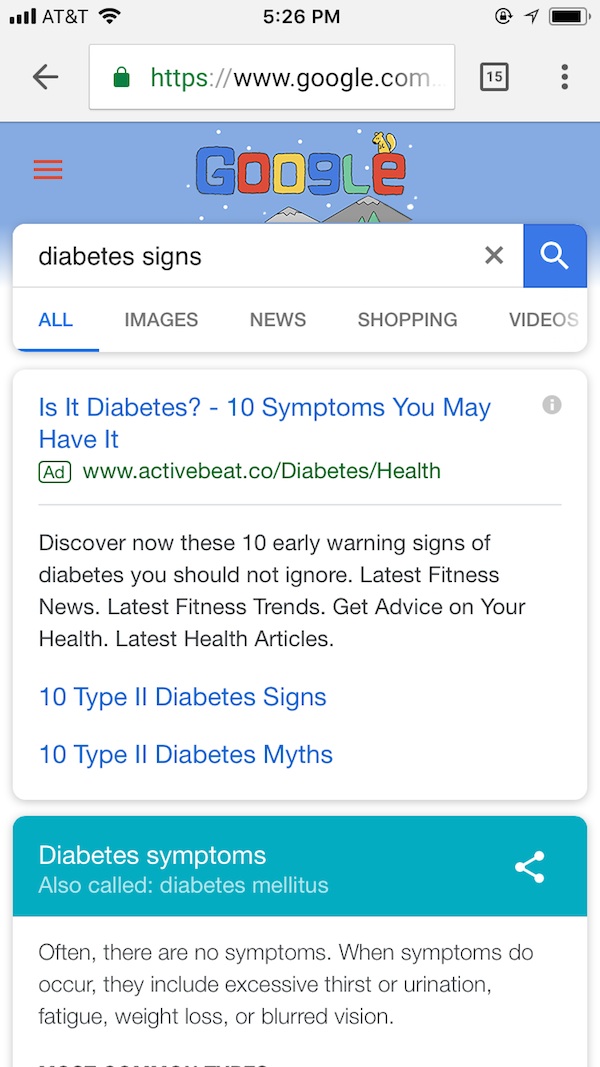Secure your place at the Digiday Media Buying Summit in Nashville, March 2-4
Publishers warm to Google, but still worry about getting crowded out in search results

Google has done several things to make publishers smile lately: From its work on fast-loading mobile pages to ending first-click-free to promoting subscription sales, Google has positioned itself favorably with publishers, especially as Facebook’s relationship with publishers has become increasingly strained.
But it’s not all rainbows when it comes to publishers’s Google relationship. There’s Google’s new Chrome ad filter where Google’s setting the rules for what ad formats get blocked. Europe is battling it over accusations that it’s squelching price competition. One critical concern: Some worry about Google’s propensity to show more and more information in its search results. Publishers are grumbling about the trend even as Google has become a growing part of publishers’ referral traffic.
In December, Google expanded the size of snippets, the two- to three-line blurb that appears under search results. In the years up until then, the search page has gotten progressively crowded, with featured snippets, also called answer boxes, that showcase the top search result, FAQs and structured data like movie showtimes. (And of course, ads.) All function to provide more answers on the search page itself and crowd out publisher content.
“Google is becoming the home page,” griped one publisher anonymously.
Publishers should focus on making content that’s great, current and in a good user experience, rather than try to optimize to every change Google makes, said another, Neil Vogel, CEO of Dotdash, parent of SEO-driven sites like Verywell and The Balance.
“That said, if you’re a publisher, it’s concerning that Google is putting more information on the search results page,” Vogel said. “The more Google answers on this page, the less they have to go somewhere else.” Right now this expansion hasn’t had a noticeable effect on Dotdash’s brands but the company’s keeping an eye on it, he said.
The issue is even more noticeable on mobile than desktop due to the screen size. Search for diabetes symptoms, for example, and you’ll see an ad, info box that Google calls a knowledge graph panel and before any publisher links appear.

“There’s less real estate, so when you see more Google-published information, it just means more scrolling down that you need to do,” said David Siegel, CEO of Investopedia, which gets more than 60 percent of its traffic from Google. According to SEMRush, 14 percent of keywords that Investopedia ranks for now contain a featured snippet.
The content creep affects publishers in all categories, particularly those that trade in content that’s commoditized, like definitions and straightforward answers to questions. Getting a simple question answered on the search page obviates the need to click through to the publisher’s site, and Google’s goal is to answer users’ questions quickly, as illustrated by a recent Outline article about CelebrityNetWorth.com, which said it was a casualty of Google’s snippets.
Google will increasingly seek ways to provide “zero-click answers” to search queries because it gives the company a competitive advantage, said Andrew Montalenti, co-founder and CTO of Parsely. Publishers should be aware of the possible impact of Google’s increasing focus on making search less about finding web pages and more about finding instant answers, he said.
Google said it does take into account snippets’ impact on publishers and that featured snippets do drive traffic for them.
Over time, Investopedia has insulated itself from this trend by reducing its reliance on definitional content from more than 50 percent of its content to under 30 percent, Siegel said. “It forces us to do a better job, to give the context,” he said.
It’s hard to say if the increasingly crowded search page has impacted traffic to publishers because traffic is made up of a lot of factors and Google traffic has been generally increasing anyway.
Those who practice search optimization say that publishers can work their way into the featured snippet or answer box and tailor their content for longer snippets. If it’s in the featured snippet and first result, Investopedia will get 10 to 20 percent more clicks than if it’s just in the first result, said Siegel. “It doesn’t necessarily help you a lot, but it doesn’t hurt you.”
“Absolutely, in some cases Google is providing the platform where people get more of their questions answered without a need for clicking off to the publisher,” said Shahzad Abbas, vp of digital media at SEO firm Define Media Group. “In some cases, they’re providing opportunities for publishers to actually get more traffic. There is one potential downside in that the expansion of the snippet is going to push down a little bit what comes after. If people have to scroll down to get to you, that ends up dramatic impacting the CTRs.”
And with Google using snippets for voice searches, now, too, publishers are wise to master them.
More in Media

Media Briefing: Turning scraped content into paid assets — Amazon and Microsoft build AI marketplaces
Amazon plans an AI content marketplace to join Microsoft’s efforts and pay publishers — but it relies on AI com stop scraping for free.

Overheard at the Digiday AI Marketing Strategies event
Marketers, brands, and tech companies chat in-person at Digiday’s AI Marketing Strategies event about internal friction, how best to use AI tools, and more.

Digiday+ Research: Dow Jones, Business Insider and other publishers on AI-driven search
This report explores how publishers are navigating search as AI reshapes how people access information and how publishers monetize content.








